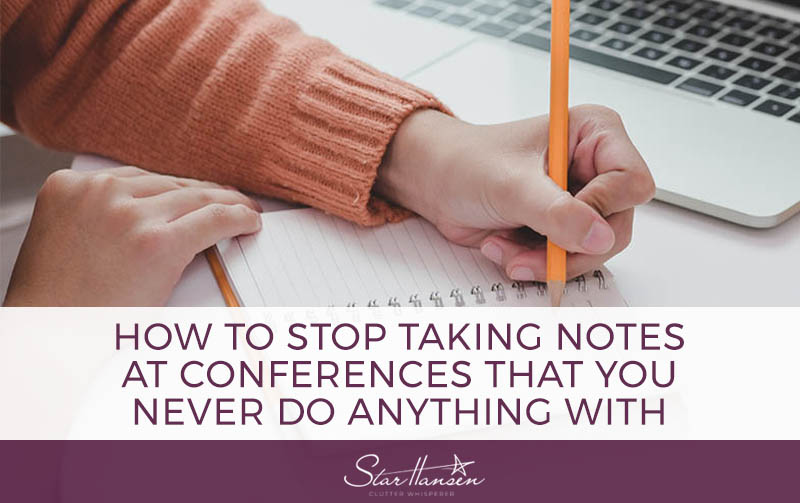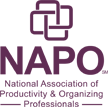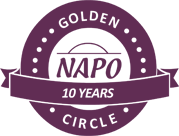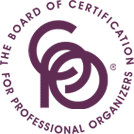How to Stop Taking Notes at Conferences that You Never Do Anything With.
I LOVE conferences! As a self-proclaimed super-nerd, conferences make me happy because I always come away with so much inspiration, insight, and empowerment. But there is one thing that I am not fond of when it comes to conferences…notes. More specifically notes that I don’t do anything with.
Yeah, I’m guilty of this too (even Professional Organizers have human moments).
There was once a set of conference notes that I moved around for over a year, promising myself “I’m going to do something with these notes.” I mean, they were so inspiring, right? Yeah, except that when I finally sat down to look at them everything was either outdated or made no sense to me. In the end, I threw them away because they weren’t relevant to me or my current goals. Sound familiar? I got tired of all that wasted knowledge, so I came up with a strategy for going to conferences. It has been a game-changer for me and I want to share it with you. There are three things you need to know when it comes to getting the most out of conferences and stop taking notes at conferences.
Take Actionable Notes
First things first, take actionable notes. How do you do this? Filter everything into one of two categories: Tasks and Reference Items. Generally speaking, these are only two types of information you will get at a conference.
The first type of information is tasks…something you need to take action on.
When you come across a task, place it immediately onto your task list for future action. For my tasks, I use an app called Wunderlist. Anytime an action pops into my head, it goes right into my Wunderlist task list. Doing this will keep you from duplicating your work later by having to transcribe your notes later. Plus you won’t have to remember what you meant by a certain word you chose or decipher the hieroglyphics of rapid writing.
The second type of information you’ll receive at a conference is resources.
A resource is information that you don’t need to take action on but serves to support either an area of your life or a project you are working on. Put that information immediately into a database that you can reference later on, ideally stored by project or area of responsibility. For my resources, I use One Note or Evernote; with the goal being to simply get all of the pertinent information in there somewhere so that I can easily search for it when I need it.
Now, if you’re not a digital person and you prefer to take handwritten notes, there’s a solution for you too. What I do when taking handwritten notes is to fold a piece of paper in half. On one side, the list just tasks and on the other side, list only resources. By separating these out you can easily find the information you need quickly. If you prefer to write your notes on one unfolded sheet of paper, no problem! Place a square next to each of your tasks (to act as a checkbox when you complete the task), and an asterisk next to your resources. This will make the information easy to identify when looking at your notes. Pre-sorting items as you’re taking notes makes them much more actionable.
Tap Out
The second thing you need to know about going to conferences is that you need to tap out when you’re full. Get what you need and then leave. This is a big one to help you stop taking notes at conferences. When you go to a conference be clear about what your goals and objectives are. What are you hoping to learn? The human brain can only focus for so long, and if you overload yourself then you won’t have the mental resources to take action on the most important things. Instead of overloading yourself, find your sweet spot and keep in that zone. Only go to sessions that serve your goals, and when you get what you’ve come for, tap out. Give yourself permission to leave. Go meditate, take a walk, journal about new insight, take action on something you learned, talk to someone about a new concept, or simply sit and ponder what you’ve just learned. You are not obligated to attend every class offered or sit through every speaker. Get what you came for, then relax and let your brain process the tasks and resources you’ve gained. If you allow yourself to go into a state of information overload, you may miss out on what you actually came for. Rest is vital to learning.
Take Action
Last but not least, take action on something every single day.
Don’t squirrel away all your actions for some future day, because that day usually doesn’t come. Your life and responsibilities are waiting for you the minute you leave that conference. Strike while the iron is hot and take action now. Act while you’re inspired and surrounded by like-minded people. The actions you take from this energy will have a greater impact now than at any other time.
I hope this information helps you as much as it helped me. If you have any of your own conference tips and tricks you want to share, leave a comment below. Happy learning!





